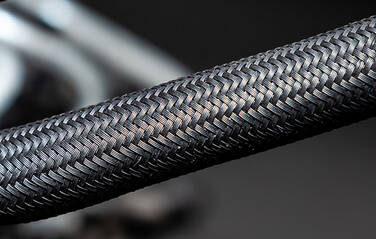What is conduit and what does it do? How do you use it? This article answers all these questions and examines the benefits of using flexible conduit.
In the electrical world, conduit is a generic term describing any system that is used to contain electrical conductors. However there are many types of conduit, used to protect and route wiring through buildings, and it can be made from a variety of materials, including metal, plastic and even clay. At cableties-online, we supply a selection of conduits and spiral wrap to both trade and domestic customers.
What is flexible conduit?
Flexible conduit, as its name suggests is not rigid, and is capable of bending easily without breaking, allowing it to bend and fit around obstacles. Flexible conduit can be made from different plastics, or metal (usually coated, galvanised steel).
What is flexible conduit used for?
Flexible conduit is the perfect solution to any situation where movement and flexibility is needed. Not only does flexible conduit protect wires and reduces the risk from hazards including electrocution, it will also protect wiring and cables from domestic pets who may try and chew through them!
When managing cables in the home or office, flexible conduit is the perfect solution for containing tangled cables and preventing them from becoming a trip hazard. It can also be used to cover unsightly bundles of wires or cables that have been secured with a nylon 6/6 cable tie first, to give a tidy appearance beneath desks or behind TV units.
Wires in exposed places such as exterior walls can be protected with a flexible split loom conduit which creates a tight, protective seal around cabling and fibre optics.
Flexible conduit is ideal for use in unfinished areas of the home such as basements and attics.
What is flexible conduit made from?
At cableties-online, our flexible conduit, split and non-split, is manufactured from polypropylene.
Features of polypropylene flexible conduit
Polypropylene is a non-corrosive material with a high melting point. Both lightweight and pliable, it offers good resistance to chemicals, solvents and cracking, making flexible conduit a cost-effective solution in harsh conditions.
The benefits of flexible conduit
Flexible conduit is a durable way of protecting wires and cables in wet conditions as it prevents water, oil and dirt from penetrating. Its high melting point renders it heat and fire resistant which reduces the pressure on electrical sockets from overheating. Installation is trouble-free, as the smooth interior and flexibility of the conduit makes it easy to insert wires and cables.
Flexible conduit from cableties-online
Our flexible conduit is sold by length (in metres) and is available in split and non-split options in a selection of internal diameter measurements up to 26.5mm. Our polyethylene spiral wrap is available with a maximum internal diameter of up to 130mm, making it ideal for use with hoses, and comes in natural or black. Our full range of conduits and spiral wrap also includes installation tools and conduit glands and can be seen here.
For help or advice on any aspect of our flexible conduit please contact us by phone on 01623 706241 or email at sales@cableties-online.co.uk






